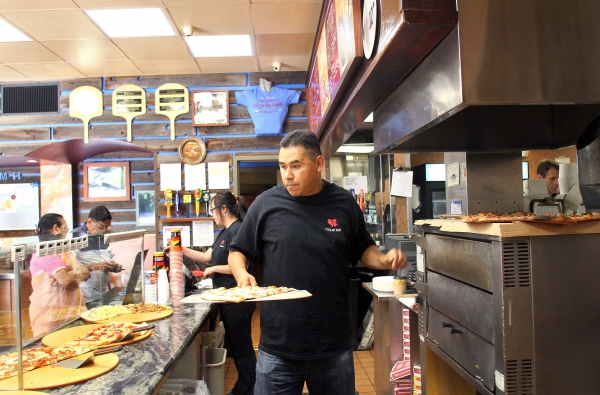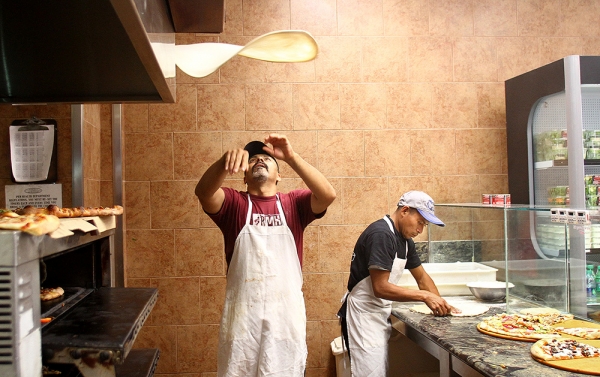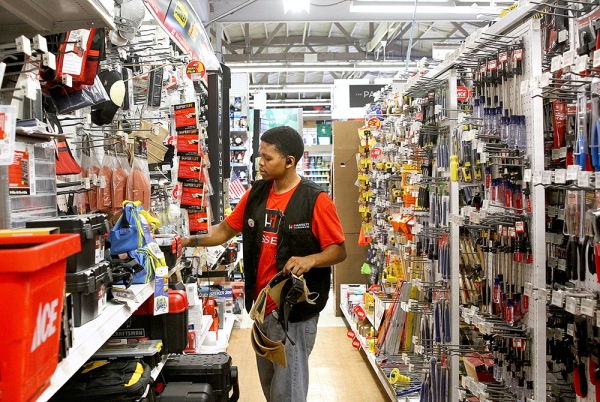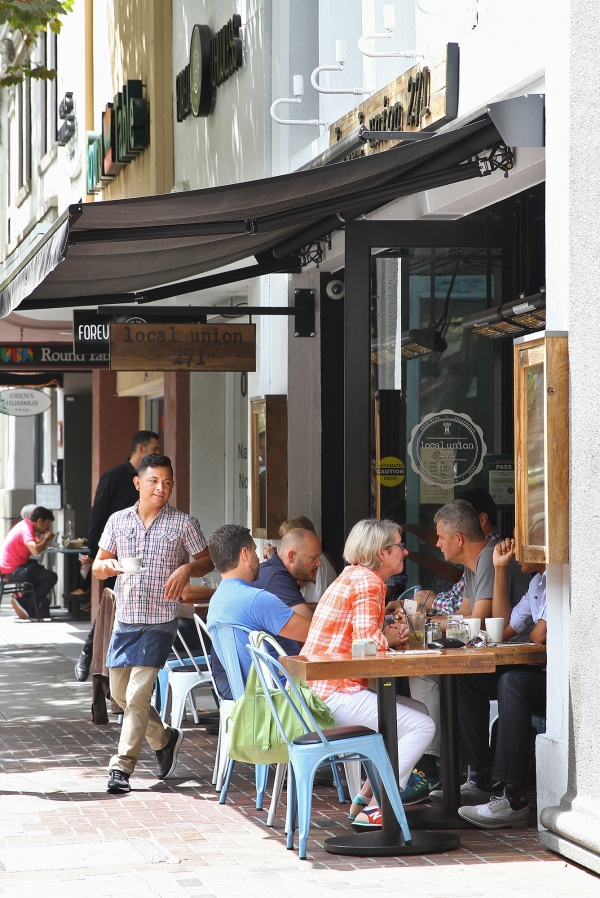The regional wave toward a higher minimum wage this week swept through Palo Alto, where city officials set aside their differences and happily united behind a law setting the local rate at $11 an hour, topping Mountain View's current rate of $10.30.
For the council, the decision was a political slam dunk. There was virtually no major push-back from the city's business community, just a few technical concerns and a few requests for specific exemptions. The Chamber of Commerce was strangely mum on the topic, holding a few discussions but declining to take an official position or to issue any statements (Chamber President Judy Kleinberg was out of town this week, did not attend the council meeting and was not available for comment). No one suggested at the council hearing that the higher wage would destroy the city's business community, force layoffs or prompt an exodus of restaurant workers. Much like recent votes to ban smoking at local parks, or to honor a stuffed donkey named Palo Alto Perry, this was a feel-good vote that was greeted with applause from the modest crowd at the meeting, who brandished "$15 by '18" signs.
The proposal follows in the footsteps of Mountain View and Sunnyvale, each of which last fall adopted a minimum wage of $10.30 an hour — a rate that will be adjusted every year based on the Consumer Price Index. Palo Alto officials went beyond that and set the wage at $11, while agreeing to join the other two cities in pursuing the goal of a $15 wage by 2018.
"We are in the right place to be going through this experiment," proclaimed Vice Mayor Greg Schmid, citing data suggesting that a minimum wage in a high-income area does not hurt the economy.
Others agreed that the higher wage is a no-brainer decision. Councilman Tom DuBois called the decision "pretty simple" and observed that the minimum wage hasn't caught up with the cost of living in the area. Councilman Greg Scharff called the plan to start with $11 and keep an eye on $15 a "measured and reasonable approach" and said he supports regional cooperation on the issue.
Before making its decision, the council heard from about a dozen speakers, including few local residents and a handful of representatives from labor groups and social-justice coalitions: Peninsula Peace and Justice Coalition, United Way and the AFL-CIO Council. All carried the same message: "Raise the wage!" This was an active crowd, made up of activists. Meghan Fraley, a member of the "15 for '18" group that lobbied Mountain View officials to raise the minimum wage, called it "fundamentally a moral imperative ... that hardworking families can earn something close to a living wage."
"Our cities are leaders and I think we need to lead the way with solidarity with each other," Fraley said.
But where, exactly, are these hardworking families? Not a single cook, waiter, porter, bagger, cashier, barista, frozen-yogurt concocter, dish washer or gas-station attendant who works in Palo Alto attended the meeting to lobby or thank the council. A total of two business owners, from Coupa Cafe and La Bodeguita del Medio, came to the meeting to offer specific suggestions. It's almost as if Palo Alto's lowest-paid employees and chief business advocates somehow didn't get the memo that their lives are about to change. Maybe many of the employees were at work, or maybe they live too far away. Or, perhaps, they recognized that in a city where affordable housing is nearly nonexistent and where the median family income hovers $120,000 (about twice the state average), an $11 wage probably doesn't buy a whole lot.
Councilman Marc Berman pointed at the rising income disparity in Silicon Valley in explaining his support for the wage increase. In February, he co-authored with his colleagues Pat Burt, DuBois and Cory Wolbach a memo calling for the minimum-wage ordinance. The memo called it "a modest but constructive step toward providing adequate income for all workers." But Berman noted Monday that the city's new wage law won't bring local employees that much closer to living in Palo Alto. Or, in most cases, anywhere close to Palo Alto
"Maybe it will allow them to live in a few affordable housing areas within 15 miles of Palo Alto, but it probably won't even allow them to do that," Berman said. "This isn't something that's really going to drastically change the way that people are allowed to live."
---
Or maybe there is another reason why Palo Alto's minimum-wage earners, business leaders and merchants generally stayed away from City Hall on Monday night.
"Here's the reality: No one pays minimum wage," Michael Ekwall, owner of a California Avenue restaurant known for its Cuban fare and smooth mojitos, told the Weekly this week. "If I told someone to come in and wash dishes at La Bodeguita and it would pay $9, they'd laugh at me. They'd throw rotten tomatoes at me. The fundamental of economics don't work."
He's not alone in thinking that way. When the Chamber of Commerce met in May to discuss the subject at a monthly policy discussion, there was little sense of panic. One prominent member of the downtown business community posited that the higher minimum wage is just the latest in a string of costs that small businesses will now have to contend with. The cumulative impact of these costs could pose a challenge for the city in retaining businesses, he suggested.
"Is this the tipping point — the raising of the minimum wage?" he asked at the Chamber discussion in May.
But even he didn't attend Monday's council meeting to lobby against the ordinance.
For others, concerns about the city's new law focused on specific details: Would it apply to teenagers looking for summer jobs? What about nonprofit organizations? One speaker, an executive at the Chamber, noted that downtown businesses currently bear "We're hiring!" signs and wondered if, from the market standpoint, this means that the these businesses currently aren't paying enough. Another, who is an executive at several large hotels, suggested that wages are "somewhat market corrected."
"If a city pops up with a rate, you can't just sit back on whatever this rate is," the hotel executive said. "It does play itself out to a certain degree. You have to stay competitive."
Nancy Coupal, owner of Coupa Cafe, also argued that paying minimum wage is rare in Palo Alto, thanks to market forces. She said she doesn't think "anyone in Palo Alto pays minimum wage right now.
"It's hard enough to get staff to come here because there's nowhere to park and it's too expensive to live here," Coupal said.
Downtown offers plenty of signs to support her position. One, displayed at Fraiche Yogurt, proclaims that the yogurt shop is seeking workers and advertises wages of $11 to $15 an hour. Downtown's Pizza My Heart raised the wage for its lowest-paid workers to $10 months ahead of California's adoption of this rate as the state's minimum wage. And Eric Hassett, owner of Hassett Hardware and four other hardware stores in the area, has raised the wage at all five stores to $10.30 — the minimum rate at Mountain View, San Jose and Sunnyvale — even though some of these stores are in cities where a lower rate would be legally permissible. He said he doesn't want employees at some stores to feel like they're worth more than their counterparts in other stores.
Even before Palo Alto began to talk about instituting a local minimum wage, Hassett said he was committed to raising his lowest wage to be competitive with the labor market — and to prevent employees from jumping ship to a different store with higher pay.
"This is about our core values. It's about integrity and everybody being treated with respect and treated as a family member," Hassett said.
Undoubtedly, the city's higher rate will have some impact on businesses like Hassett Hardware and Pizza My Heart — though in Palo Alto's larger retail ecosystem, businesses that pay non-tipped workers minimum wage appear to be a minority. Hassett told the Weekly that the move to $11 an hour will cost his business about $200,000 annually. To make this work, the business would have to cut its budgets for things like donations, community outreach, advertising and marketing. He does not, however, anticipate trimming any positions or slashing schedules, he said.
---
Studies of the minimum wage have found that, particularly in restaurants, increased pay makes the prices go up. A 2014 study by the University of California, Berkeley Institute for Research on Labor and Employment concluded that a minimum wage, while reducing employee turnover and raising employee morale, also leads to small price hikes, particularly at restaurants (it estimates that the prices go up by about 0.7 percent after a 10 percent minimum-wage increase).
Indeed, when Pizza My Heart employees recently received a small pay increase, customers helped swallow the higher cost as a $29.50 pie became a $32 pie. But like with Hassett, the pizza restaurant's decision to raise its employees wage was driven by the market and preceded Palo Alto's requirement, which won't kick in until January.
But the implications of increased wages will be more complicated for high-end restaurants, where tips play a central role in compensation. Ekwall of La Bodeguita expects his costs to jump by $40,000 when Palo Alto's minimum wage takes effect. But what bothers him the most isn't so much the added expenses but the way in which they'll have to be distributed. Fourteen people in his staff of 40 make minimum wage, he said. But because of tips their lowest take-home pay is about $22 an hour. At the high end, it's more like $50. Ekwall said the city's new law means he will have to raise the wages of the tipped employees and will have little or nothing left for managers and other non-tipped employees, whose take-home pay is often less than waiters.
On Monday, Ekwall urged the council to consider a mechanism that has been debated in Los Angeles and other cities: a tiered system that would distinguish between tipped and non-tipped employees. He recommended that the city take a few weeks to consider the proposal before passing the minimum-wage law.
After the meeting, Ekwall said he was glad that the council at least heard him out and agreed to consider exemptions in the future. He also said he was disappointed that the usually data-driven council couldn't take a few extra weeks to study this proposal further and refine the ordinance.
"Why are we jumping the gun and making a decision without getting the data and the information we need?" Ekwall told the Weekly. "Consider the guy at the gas station, collecting payments and earning a minimum wage. How can we say that this person should be classified in the same way as a waiter at a restaurant who is also making minimum wage but who, in addition to that, is making $25 to $30 an hour in cash tips?"
But according to the city attorney's office, excluding tipped workers would place the city into murky and barely charted legal territory. Currently, state law governing minimum wage does not allow employers to distinguish between tipped and non-tipped employees. For local minimum wage ordinances, the matter is even less clear, said Senior Assistant City Attorney Cara Silver. The issue was recently considered in Los Angeles, where city officials considered a "total compensation package" that makes a distinction between tipped and non-tipped workers. Labor groups argued that this would violate state law while restaurant lobbyists claimed that a two-tiered system is permitted, Silver said. The Los Angeles City Council ultimately scrapped the idea.
"We do not yet have a published legal decision, so we do believe it's still a questionable issue," Silver said.
Outside California, the question has already been answered, usually in the affirmative. Minimum-wage laws in Montgomery County and Prince George's County, both in Maryland, Albuquerque, and Santa Fe County, New Mexico, and Washington D.C. distinguish between tipped and non-tipped employees, according to the Berkeley study. Los Angeles, San Francisco and San Jose do not. If Palo Alto tries to go with a tiered system during the next leg of its march toward $15, it could face the same legal challenges and union opposition that hindered the Los Angeles proposal. There was little indication, much less consensus, on this issue Monday. Wolbach said the subject deserves "a separate conversation" and took a cautious approach.
"I'm not sure I want to be the first city to take that on and face lawsuits," Wolbach said.
But Scharff said he believes the legal issues can be "easily resolved by exempting wait staff."
"I think the notion that there is a legal impediment to doing this is silly," he said. "We can easily design a policy to get to where we want to go."
Mayor Karen Holman and council members Eric Filseth and Liz Kniss also said they were concerned about the tips issue and want to see the council further explore both the tiered system and the idea of restaurants adding a "service charge" to bills. Filseth, who made the motion that concluded the discussion, argued some exceptions would make sense and called for the Policy and Services Committee to explore options. These would specifically include exceptions for tipped wait staff and seasonal jobs for teenagers.
"An across-the-board minimum wage for everybody may be too blunt an instrument," Filseth said. "I'm sensitive to the tips issue — tipping is a different wage structure, but it's still a wage. But if you're making $40 an hour, it's not minimum wage."
---
Palo Alto will have plenty of company tackling these issues. Seemingly every month another Bay Area city joins the movement, with Campbell and the City of Santa Clara now considering their own ordinances. The U.S. Conference Of Mayors' Cities of Opportunity Task Force took the position in Aug. 14 of supporting higher minimum wages, and Santa Clara County's Cities Association recently formed a subcommittee focusing on the topic. The subcommittee recommended more consistency among new ordinances in the region and noted that Mountain View's and Sunnyvale's wage laws are the only ones aligned.
The subcommittee, which includes Sunnyvale Mayor Jim Griffith, Mountain View Mayor John McAlister and Cupertino Mayor Rod Sinks, also took a position against creating an exception for wait staff, noting that doing so would have "significant and direct regional impact," given that existing ordinances don't make such an exception. They also note that state requirement doesn't make an exemption, which would make a local stipulation "difficult to justify."
In Palo Alto, there is little appetite for aligning the local ordinance with those of neighboring cities. Council members said Monday that while they favor regional cooperation on this issue, they have no desire to "mimic" other cities, as Wolbach put it. Berman also said the city "shouldn't rush to get on the same page" as the other cities.
"We didn't start in the same place and the same time," Berman said. "We in Palo Alto need to make sure we respond to our community and the business community in how we implement our increase. If we end up on same path in 2017 and not in 2015, I think it's OK as long as we end up with a regional approach."
Ekwall, for his part, hopes that as the council progresses with the minimum-wage changes it makes a greater effort to reach out to businesses and consider their concerns. He said he was disappointed with the council's adoption of an ordinance without considering the issue of tips and with what he said was insufficient outreach. He also called the reasoning weak that "nobody else" has created a tips exemption. Ekwall said he supports the council's overarching goal but faulted its execution.
"All the people they want to help are being left out in the cold," Ekwall said.
The council, for its part, is confident that it's going in the right direction. All nine council members agreed that the wage proposal passed by the Policy and Services Committee in May and approved this week by the full council is the right approach. DuBois called it a "reasonable compromise" that doesn't hurt businesses by moving too far, too fast. Wolbach agreed.
"It's reasonable. It's prudent," he said.
Videographer/Photographer Veronica Weber contributed to this report.







Comments
Registered user
Old Mountain View
on Aug 28, 2015 at 8:00 pm
Registered user
on Aug 28, 2015 at 8:00 pm
I think that this is a very well written article with lots of interesting facts in favor of the higher minimum wage. However, I do have a few questions about some of the studies that were cited here.
I would like to have seen for example, some of the data points used in the Berkeley study. It was not clear to me whether or not they based their conclusions on past minimum wage hikes or the projected future hikes. This makes a huge difference in the outcomes as past hikes have been years if not a decade or so apart, and were about 5-20% increases which could be absorbed into the economy.
The current increases being considered are a whopping 50% over a 2 to 3 year period in an economy which can only be called anemic at best ( unless you are working in high tech and are not working for minimum wage). I strongly agree with Mr. Ekwall that more data is needed and the existing data needs to be carefully analyzed before every city jumps on the "me too" bandwagon which seems to be prevalent in the Bay Area.
The glut of high tech jobs in Mountain View brought much higher wages, but that did not help most of the low and medium income people that live (or lived) here. Many were forced out or saw their rents go up precipitously. If minimum wage is raised at the rate being proposed, $15 by 18, no one should be surprised if rents are adjusted in a short time as a result. There will also be at least some increased in the costs of goods and services.
I would recommend that those who make minimum wage and live in these cities where the minimum wage increases are being proposed, calculate what percentage of their income currently is being allocated for necessities such as food and shelter, and then perform the calculation again each year after the increase passes (and assuming that they still have a job). It would be interesting to have hard data to provide for the next time this idea is considered.
I would suggest that the City Councils to a hard look at Walmart ( Web Link ), Wendys ( Web Link ), McDonald's ( Web Link ), and the failed experiment at Gravity Payments ( Web Link ) where the owner made everyone's pay, including his own, al living wage of $70,000/Yr, and ended up losing his best employees and having to rent out rooms in his house to other people just to make ends meet.
I am assuming that all the cities currently considering this will go ahead and pass it anyway because it is the 'compassionate' thing to do, and if they fail to do so the city leaders may think that people will consider them to be heartless and unsympathetic to the plight of low and middle income residents.
As someone who worked for minimum wage for many years, I can honestly say that the best way to improve one's life is through more education and training. It is expensive, but there are a lot of sources of free money for those in the lower income levels. There are also guaranteed loans for those that exceed the income limit and over time one can earn far more than what will be spent to repay those loans.
I have lived through 4 decades of politicians that promised to make my life better only to find that most of the policies only benefited their reelection chances, and their friends. In the end, I realized that if I wanted to make my life better, I had to go out and work hard and make sacrifices for it. Ask anyone who is successful and they will tell you the same thing, no minimum wage raise ever made them successful or allowed them to achieve their full potential.
Jim Neal
Old Mountain View
Registered user
Old Mountain View
on Aug 31, 2015 at 10:44 pm
Registered user
on Aug 31, 2015 at 10:44 pm
Thank you Gennady for your article and to you Jim for your reply.
Indeed, a $15 per hour wage in a city where the average house is north of $1 million is slam dunk policy. However, a national policy of $15 is destructive in small rural communities with a very different cost of living structure.